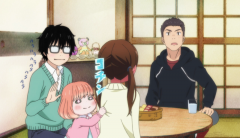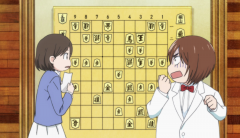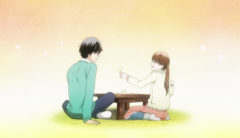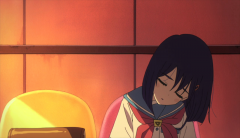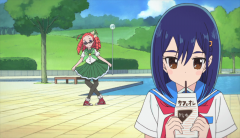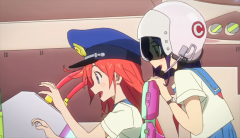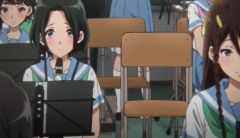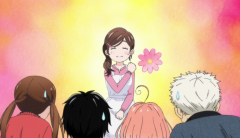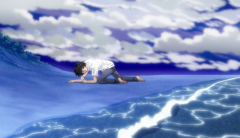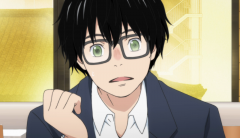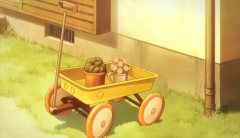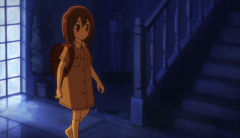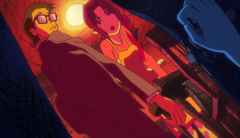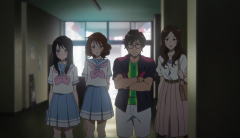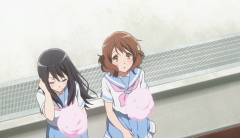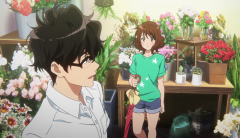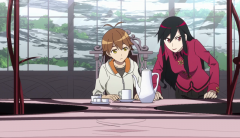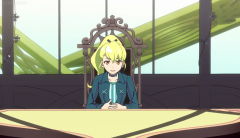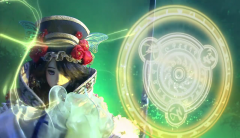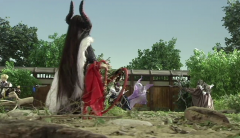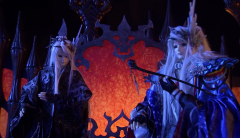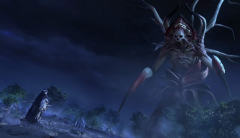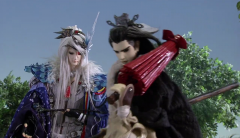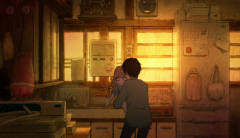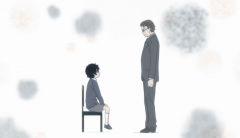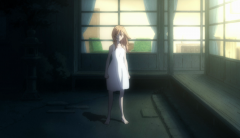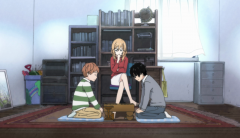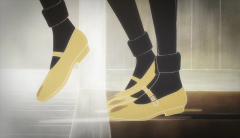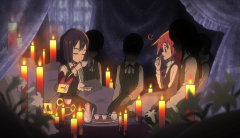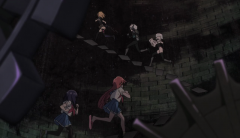Oh, the vitality of youth and first crush! It’s fun to see Hina’s under that crush spell and making a big fuss over Takahashi coming for dinner. As for Takahashi, he climbs up from being “an object of desire” from last few episode to a very straightforward and a bit serious boy now (anyone seen him smile once?) but his cold appearance is a nice contrast to Hina’s nervous sicken state. Well, enjoy it while it lasts girl because you ain’t gonna feel it again when you’re getting older.
It seems the show now covers the source material a bit faster now (2 and a half chapters per episode), but if that’s the case then I’m not totally on board with it. The main reason being each chapter is a self-contained story, even with chapter that begins as mundanely such as this one, being “Takahashi comes over for dinner and the family enjoy the night together”, it still manages to pull off a satisfying punch; that’s why breaking the chapter apart feels a bit disruptive to the flow of the story and could potentially lose its emotional earnest. This episode gets away with this issue this time, because of the continuity of Takahashi appearing in two chapters, but I’m not so sure if they can manage that next time. I would prefer they either stick with 2 chapters or they can speed up with 3 chapters per episode, but since I’m enjoying the deliberate pacing as it is now so I hope they won’t change that much.
As I mentioned above I very much enjoyed the chapter-style of the show so far, as each chapter manages to give a different angle to Rei and the people surrounding him. In contrast with the dark and sad story from last week, this episode shines with light touch and upbeat tone that actually signals the grow of Rei, even just a slightly bit. Firstly, through his honest-but-shabby explain to Takahashi, he’s actually able to reach him. Human interaction and connection is one of the most important fragment in our life, and sadly Rei is always out of touch with it. With just a little affection from Takahashi, it means a world to Rei, but it’s true that everyone would feel this happy when others understand exactly what you mean, especially someone who often self-doubt like Rei. Secondly, he’s now willing to take risks as well. With his old-self, for a shogi move that he feels too dangerous, he’d retreat instead; but now he’s heading over it to see if he can handle it. Although it costs him the match, I’d say it’s important for him to take that risk so that he could learn from his mistake. Finally but most importantly, he’s exploding over Harunobu’s comments, and that step is extremely important because it shows that he cares. As contrary to his fear last week, he actually cares for shogi and he cares for himself so he cannot stand to be talked down like that. At least he still feels something. You’ve grown Rei!
The supporting cast also works like a charm this week. For once, I feel Botoro’s (oh, I mean Harunobu’s) passionate advice from a shogi commentary no less as sincerely and heart-felt instead of annoying and I feel this is one of the strongest moments in this episode. He’s always the opposite to Rei in term of personality, as Rei always keeps his feeling inside himself, he is the one who says out loud what he feels and those advises are what Rei needed to hear (again and again in recorded tape or VCR that is). He really cares for his friend and even him appearing in later part to teach Hina and Momo shogi come off as necessary contrast to Rei’s stiff and machine-like teaching. Takahashi also shows his passionate side for baseball, and he fits like a glove to the rest of cast and his looking-up to Rei as a (sort-of) role model making them a weird (but nice) pair. Lastly, I know it isn’t much but look how shy and stiff Hina was at the beginning of the dinner, and then to her smile as she giving a piece of fruit to Rei and acting so herself in front of Rei, I feel a warm feeling inside me.
This episode might be a bit too light for 3-gatsu no Lion, but it’s by no mean a filler or even a mediocre episode. There’s still so much details to enjoy here and this episode is just so fun to watch. It’s great to see Rei has matured from time to time and seriously, who would say no to a shogi cat-warrior dance? Damn entertaining!


